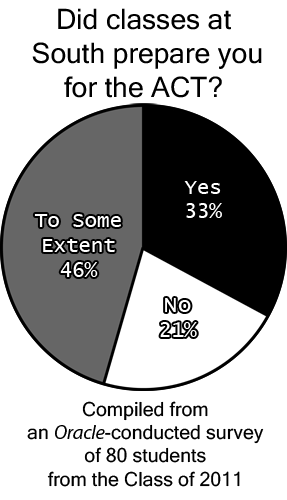The Glenbrook South graduating Class of 2011 continued a recentupward trend by scoring a 24.7 on the ACT, the highest averagein school history.
This continues a trend that began when the ACT was first madea requirement in Illinois as part of the Prairie State AchievementExam testing, a required test implemented in 2001 that measures the progress of juniors in Mathematics, English, Science, Reading and Writing. This score has steadily continued its progression and reached 24.5 for the Class of 2010, according to Principal Brian Wegley.
This improvement, according to sources, can be attributed to the release of College Readiness Standards (CRS), increased emphasis of tested skills in everyday learning, as well as individual graduating classes’ starting points, as measured by the EXPLORE test.
The CRS, released by the ACT organization, are statements meant to communicate the necessary skills tested on the ACT. They also help students, parents and teachers interpret the scores on the EXPLORE, PLAN and ACT. These are the ACT’s three assessments designed to test students’ progress from grades eight to 12. Since these standards were published, GBS has paid attention to the CRS when structuring its curriculum.
“We’re trying to make sure that our quality curriculum is aligning with the[…]College Readiness Standards,” Wegley said.
Cameron Muir, associate principal of curriculum and instruction, believes that the alignment with these standards has had a positive effect on GBS’ overall ACT score.
“When the standards…become cognizant in the teachers’ minds and they become explicit about it, it’s just natural for something to then start improving in terms of the students’ performance,” Muir said.
Teachers have worked to integrate the CRS in their classrooms. With standardized testing being used as a tool to measure the quality of schools under the No Child Left Behind Act, the law passed under the Bush Administration, critics caution schools against “teaching to the test.”
According to an Oracle-conducted survey of 43 teachers, 70 percent believe there is “just the right amount of emphasis” on CRS in GBS classrooms.
“We don’t want test scores to run the curriculum, but we do want students to be prepared for future endeavors,” math teacher Teresa Youngberg said.
The emphasis on CRS has led to increased alignment of the CRS with curriculum in the classroom. Math teacher Kathy Coskey says that she does weekly ACT practice as warm ups in her classes with juniors to further their preparation for the ACT.
According to the Oracle-conducted survey, 75 percent of teachers reported that they have altered their curriculum since the publishing of the CRS.
College Counselor Ann LePage, who advises students on the college-application process, agrees that class curriculum is valuable to ACT preparation.
“The best test prep is doing a great job every single day in the classroom,” LePage said.
However, about 10 percent of GBS teachers surveyed believe there is “too much emphasis” on CRS.
The record average ACT score achieved by the class of 2011 was two-tenths of a point higher than the previous record, which was set by the class of 2010.
“A tenth [of a point] may not be statistically significant from one year to the next, but if you look at the common increase, the cumulative effort is statistically significant,” Muir said.
Muir and Wegley emphasize the importance of the average growth seen from the EXPLORE test to the ACT test rather than the average ACT score itself. The EXPLORE test, taken the first months of freshman year, can be used as an early indicator of how a class will perform on the ACT. In 2006, South set a goal for each student to increase their score six points from the EXPLORE test to the ACT test.
In 2006, 47 percent of students met that goal and in 2011, 64 percent of students met that goal.
According to Wegley, the percentage of students who meet the six-point growth will continue to increase because of the focus on aligning the curriculum with the CRS.
Wegley sees the growth from the EXPLORE to the ACT as the most accurate measurement of GBS’s success in preparing students because the EXPLORE test provides a baseline measurement of students’ abilities.
“[The growth from EXPLORE to ACT] is more reflective of the quality of the curriculum in this building [than ACT scores all by themselves],” Wegley said.







